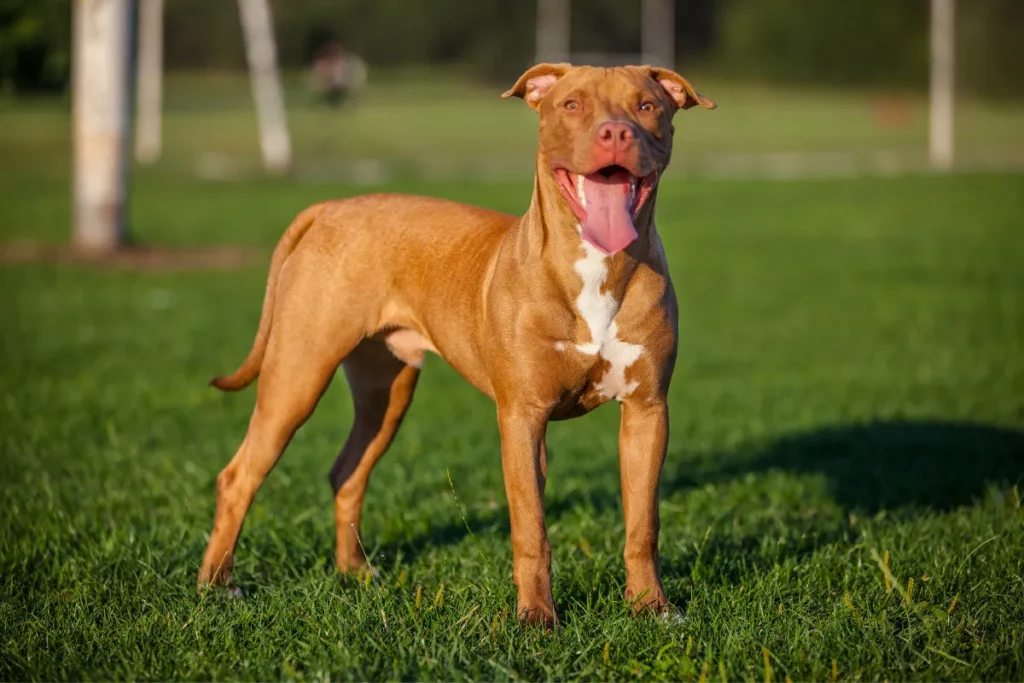Dogs are beloved companions, enriching our lives with their loyalty, affection, and playful personalities.
However, it’s essential to recognize that different dog breeds come with varying temperaments, behaviors, and potential challenges.
While all dogs have the capacity to be loving and loyal, some breeds may require extra care, training, and socialization due to their inherent characteristics.
In this comprehensive guide, we’ll explore the top eight riskiest breeds of dog, shedding light on potential challenges and emphasizing the importance of responsible ownership.
Pit Bull Terrier:

Pit Bull Terriers often face misconceptions due to their muscular build and history of being used in dogfighting.
While Pit Bulls can be affectionate and loyal companions, they may exhibit aggressive tendencies if not properly trained and socialized from an early age.
Responsible ownership, including positive reinforcement training and proper socialization, is essential to ensure that Pit Bulls grow into well-adjusted and balanced pets.
Rottweiler:
Rottweilers are known for their strength, loyalty, and protective instincts.
However, these qualities can pose challenges for inexperienced owners if not properly managed.
Without adequate training and socialization, Rottweilers may exhibit territorial behavior and aggression towards strangers.
Responsible ownership includes early socialization, obedience training, and supervision around unfamiliar people or animals.
German Shepherd:
German Shepherds are intelligent, versatile, and highly trainable dogs, often employed in roles such as police work, search and rescue, and service dog work.
However, their intelligence and protective instincts can lead to aggressive behavior if not channeled appropriately.
Proper training, socialization, and mental stimulation are crucial for German Shepherds to thrive as well-adjusted family pets.
Doberman Pinscher:
Doberman Pinschers are renowned for their loyalty, intelligence, and athleticism.
However, they can be prone to territorial behavior and aggression towards unfamiliar people or animals if not properly socialized and trained.
Responsible ownership includes early socialization, obedience training, and providing outlets for their energy through regular exercise and mental stimulation.
Bullmastiff:
Bullmastiffs are powerful and protective dogs, originally bred to guard estates and livestock.
While they are typically gentle and affectionate with their families, they may exhibit aggression towards strangers if not properly trained and socialized.
Responsible ownership includes early socialization, obedience training, and providing clear leadership to prevent any potential behavioral issues.
Siberian Husky:
Siberian Huskies are known for their stunning appearance, independent nature, and high energy levels.
While they are friendly and affectionate with their families, they have a strong prey drive and may display escape artist tendencies if not properly secured.
Responsible ownership includes providing adequate exercise, mental stimulation, and supervision to prevent roaming behavior.
Alaskan Malamute:
Alaskan Malamutes are large, strong, and independent dogs, originally bred for sledding and hauling heavy loads.
While they are typically gentle and affectionate with their families, they can be stubborn and strong-willed if not properly trained and socialized.
Responsible ownership includes consistent training, providing outlets for their energy, and establishing clear boundaries and expectations.
Akita:
Akitas are known for their loyalty, courage, and dignified demeanor.
However, they can be territorial and aloof with strangers, requiring early socialization and obedience training to prevent aggression towards unfamiliar people or animals.
Responsible ownership includes providing proper socialization, supervision around strangers, and positive reinforcement training techniques.
Conclusion:
While the breeds mentioned above may have certain characteristics that present challenges for some owners, it’s essential to remember that every dog is an individual.
Proper training, socialization, and responsible ownership play crucial roles in shaping a dog’s behavior and ensuring a positive relationship between pet and owner.
Before bringing any dog into your home, it’s important to thoroughly research the breed, assess your lifestyle and capabilities as a pet owner, and seek guidance from experienced professionals if needed.
With dedication, patience, and love, any dog can become a cherished member of the family, regardless of breed or background.